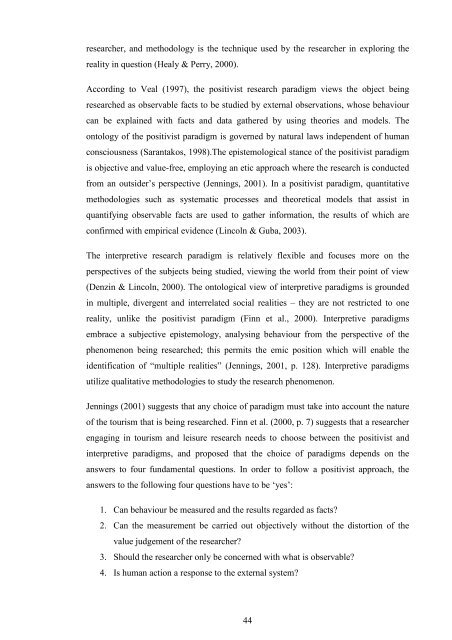The Role of Local Food in Maldives Tourism - Scholarly Commons ...
The Role of Local Food in Maldives Tourism - Scholarly Commons ...
The Role of Local Food in Maldives Tourism - Scholarly Commons ...
You also want an ePaper? Increase the reach of your titles
YUMPU automatically turns print PDFs into web optimized ePapers that Google loves.
esearcher, and methodology is the technique used by the researcher <strong>in</strong> explor<strong>in</strong>g the<br />
reality <strong>in</strong> question (Healy & Perry, 2000).<br />
Accord<strong>in</strong>g to Veal (1997), the positivist research paradigm views the object be<strong>in</strong>g<br />
researched as observable facts to be studied by external observations, whose behaviour<br />
can be expla<strong>in</strong>ed with facts and data gathered by us<strong>in</strong>g theories and models. <strong>The</strong><br />
ontology <strong>of</strong> the positivist paradigm is governed by natural laws <strong>in</strong>dependent <strong>of</strong> human<br />
consciousness (Sarantakos, 1998).<strong>The</strong> epistemological stance <strong>of</strong> the positivist paradigm<br />
is objective and value-free, employ<strong>in</strong>g an etic approach where the research is conducted<br />
from an outsider’s perspective (Jenn<strong>in</strong>gs, 2001). In a positivist paradigm, quantitative<br />
methodologies such as systematic processes and theoretical models that assist <strong>in</strong><br />
quantify<strong>in</strong>g observable facts are used to gather <strong>in</strong>formation, the results <strong>of</strong> which are<br />
confirmed with empirical evidence (L<strong>in</strong>coln & Guba, 2003).<br />
<strong>The</strong> <strong>in</strong>terpretive research paradigm is relatively flexible and focuses more on the<br />
perspectives <strong>of</strong> the subjects be<strong>in</strong>g studied, view<strong>in</strong>g the world from their po<strong>in</strong>t <strong>of</strong> view<br />
(Denz<strong>in</strong> & L<strong>in</strong>coln, 2000). <strong>The</strong> ontological view <strong>of</strong> <strong>in</strong>terpretive paradigms is grounded<br />
<strong>in</strong> multiple, divergent and <strong>in</strong>terrelated social realities – they are not restricted to one<br />
reality, unlike the positivist paradigm (F<strong>in</strong>n et al., 2000). Interpretive paradigms<br />
embrace a subjective epistemology, analys<strong>in</strong>g behaviour from the perspective <strong>of</strong> the<br />
phenomenon be<strong>in</strong>g researched; this permits the emic position which will enable the<br />
identification <strong>of</strong> “multiple realities” (Jenn<strong>in</strong>gs, 2001, p. 128). Interpretive paradigms<br />
utilize qualitative methodologies to study the research phenomenon.<br />
Jenn<strong>in</strong>gs (2001) suggests that any choice <strong>of</strong> paradigm must take <strong>in</strong>to account the nature<br />
<strong>of</strong> the tourism that is be<strong>in</strong>g researched. F<strong>in</strong>n et al. (2000, p. 7) suggests that a researcher<br />
engag<strong>in</strong>g <strong>in</strong> tourism and leisure research needs to choose between the positivist and<br />
<strong>in</strong>terpretive paradigms, and proposed that the choice <strong>of</strong> paradigms depends on the<br />
answers to four fundamental questions. In order to follow a positivist approach, the<br />
answers to the follow<strong>in</strong>g four questions have to be ‘yes’:<br />
1. Can behaviour be measured and the results regarded as facts?<br />
2. Can the measurement be carried out objectively without the distortion <strong>of</strong> the<br />
value judgement <strong>of</strong> the researcher?<br />
3. Should the researcher only be concerned with what is observable?<br />
4. Is human action a response to the external system?<br />
44

















